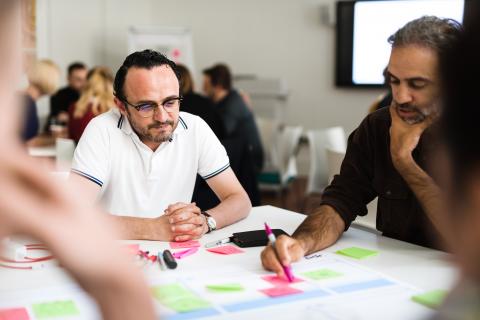Pharmaceuticals and antimicrobial resistance in the environment
On 27–28 April 2022, the Policy Learning Platform held an online peer review for the Swedish Environmental Protection Agency and the Swedish Knowledge Centre on Pharmaceuticals in the Environment at the Swedish Medical Products Agency.
The hosts requested advice regarding their policy challenge concerning pharmaceuticals in the environment, including antimicrobial resistance.
A detailed description of the challenges and the recommendations can be found in the follow-up report which will be published soon.
Sweden is one of the nine countries surrounding the Baltic Sea. Governed by unique hydrographical and climatic conditions, the Baltic Sea is the planet’s largest body of brackish water. Its enclosed nature makes it ecologically unique and very sensitive to environmental pressures such as eutrophication, contamination from hazardous substances, marine litter, fishing and habitat loss.
The macro-region follows a European Union Strategy for the Baltic Sea Region (EUSBSR). One of the policy areas of this strategy is focused on protecting the Baltic Sea from pollution by hazardous substances, mainly on pharmaceuticals in the environment.
There are two major entry paths for residues, bacteria and antimicrobial genes to the Baltic Sea:
- Households and health care facilities via wastewater treatment plants (WWTP; water effluents and sludge)
- various veterinary practices leading to diffuse discharges via manure and slurry.
In addition, biogas plants can be pathways for spreading pharmaceuticals to the environment.
While wastewater reuse and application of sludge as fertiliser on fields are important parts of circular economy, they also provide a potential route for exposure to chemical contaminants. The aim of this peer review was to identify the end of life and upstream solutions to manage and reduce pharmaceuticals and antimicrobial genes in the environment.
Alongside Magda Michaliková and Astrid Severin, our environment and resource efficiency Thematic Experts, five excellent peers were invited, and participated in the peer review:
- Sky Redhead, University of South Wales, Wales, UK
- Claire Albasi, Laboratoire de Genie Chimique (CNRS), Toulouse, France
- Samuel Moles, University of Zaragoza, Zaragoza, Spain
- Fatma Yalcinkaya, Technical University of Liberec, Liberec, Czech Republic
- Isabel Martinez Alcala, Universidad Católica San Antonio de Murcia, Guadalupe, Spain
The experts came together to share their experience and provide recommendations for ways of tackling EUSBSR’s challenges related to pharmaceuticals in the environment. They provided the host with valuable insight, know-how and practical suggestions for solving the challenges presented above.
The peers presented an overview of upstream and downstream solutions to best reduce and manage pharmaceuticals and antimicrobial resistance in the environment.
They indicated a knowledge gap and lack of data, highlighted different technologies for the most effective treatment of wastewater and sludge, pointing out there is no silver bullet, and a combination of techniques is needed to achieve the best results.
The peers recommended mitigating the problem upstream by increasing awareness of the risks related to pharmaceuticals in the environment on both policy and citizen levels, stakeholder involvement, good communication, and the use of incentives and regulation on national and EU levels.
The peers recommended the host to:
- create a list of the most frequently used and critical types of antibiotics for human and veterinary use and select substances to be monitored,
- monitor the concentrations of the selected substances, monitor antimicrobial resistance through the use of a specific indicator for antimicrobial resistance genes,
- map the technologies already deployed,
- map the hotspots for the introduction of antibiotics into the environment to concentrate investments,
- reduce consumption through communication campaigns and create investment programmes for wastewater treatment plants.
The host’s policy challenges and all the peer suggestions will soon be available in the follow-up report.
Pleased with the outcome of the two full days of intense discussions moderated by the Policy Learning Platform, Marmar Nekoro, from the Swedish Medical Products Agency, commented:
“We would like to thank everyone for their time and valuable input. We have gathered a lot of knowledge and got a better understanding of the policy gaps regarding pharmaceuticals in the environment and antimicrobial resistance. It is clear that we need action throughout the lifecycle of pharmaceuticals, cooperating across disciplines and sectors and with regards to medicine and the environmental dimension – a true OneHealth perspective.”
From the side of the peers, Sky Redhead from the University of South Wales remarked:
“I enjoyed a wonderful two days with the stakeholders from the Baltic Sea Region and the peers. There have been amazing presentations!”
Claire Albasi from Laboratoire de Genie Chimique (CNRS) added:
“The Peer Review has been an excellent occasion to meet other experts on pharmaceuticals in the environment. I am really happy to have met the other peers.”
The host used the peer review to engage local stakeholders in a very lively discussion and is now assessing the recommendations received to see how they could inform the decision-making process to improve the management of pharmaceuticals in the environment and cooperation pertaining to these matters across the region.
Apply for a peer review
Find solutions to your policy challenges together with our experts and peers!

